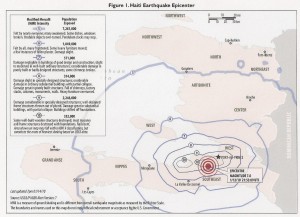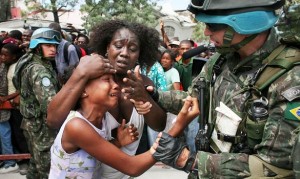
Crowds seeking aid in Haiti met with pepper spray and rubber bullets
Desperate crowds have overwhelmed peacekeepers trying to deliver aid. The World Food Programme says that Port-au-Prince represents the greatest logistical challenge it has ever faced
“They’re not violent, just desperate. They just want to eat,” Fernando Soares, a Brazilian army colonel, said. “The problem is, there is not enough food for everyone.”
Phi Beta Iota: We are furious at both the lack of decision-support (reliable broad information illuminating the breadth and urgency of the problem) and the lack of decision-makers with gravitas. Someone needs to reach the Chairman of the Joint Chiefs of Staff (C/JCS) and tell him to pay attention. Roll the C-130's and carpet bomb the place with water, food, tents, etc. The National Guard C-130 pilots and crew chiefs know how to do “touch and go” drive-by load delivery without landing–why is our anemic military using just two of the six commercial capable airports and just one of the six commercial capable ports and NONE of the helicopter landing zones across the country? We agree with William McNulty who has had EYES ON–we need to hold both commanders and their intelligence officers responsible for this massive failure to Observe, Orient, Decide, and Act (OODA). We also recommend the observations by Dr. Zbigniew Brzezinski and the Italian leaderMr Bertolaso on the pathetic inadequacy of American assistance. Uninformed, insufficient, a disgrace.
Meteorological Forecast: Rain and Diarrheal Illness
Forecasts for PAP calling for 20-30% chance of rain in the coming days. Concerned about influence on transmission of gastroenteritis and diarrheal illness. Monitoring closely.
Diarrheal disease was assessed to be the top priority in the immediate term following the earthquake. We are now seeing indications of diarrheal disease increasing in the camps, particularly among the children. We are very concerned about these reports.
Haiti Catastrophe Raises Biosecurity Concerns
As the slow process of recovery begins, re-establishing some normalcy of life will be critical and animals play a role in the lives of people in Haiti as they do around the world. One of the key issues will be focusing on Haiti's livestock and large population of stray animals.
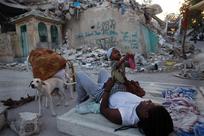
The response to these issues raises potential concerns for the U.S. livestock industries, says AASV. There are a number of reportable trans-border diseases endemic or suspected on the island of Hispaniola which, if introduced into the U.S. livestock herd, would have devastating effects on animal agriculture…
Haiti's children on their own on shattered streets
PORT-AU-PRINCE, Haiti — The children with no names lay mute in a corner of the General Hospital grounds Tuesday, three among thousands of boys and girls set adrift in the wake of Haiti's earthquake.
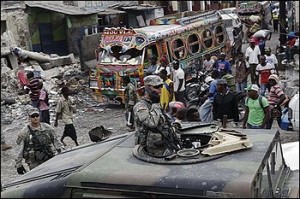
Clinton: Critics of US Haiti relief misguided
WASHINGTON — Secretary of State Hillary Rodham Clinton said Tuesday she resents criticism of the U.S. effort to help stricken Haiti and pledged to redouble efforts to help survivors of the Jan. 12 earthquake.
“I deeply resent those who attack our country, the generosity of our people and the leadership of our president in trying to respond to historically disastrous conditions after the earthquake,” Clinton said.
Phi Beta Iota: The Secretary is not properly informed by State/INR, CIA, or the Embassy in Haiti that has locked itself in. We find it noteworthy that she does not mention Dr. Zbibniew Brzezinski, whose comments on CNN were first reported here and remain a stellar example of real statemanship. The sorry reality is that the Secretary–and those who provide her with intelligence–are out of touch with reality on the ground. See for instance, the EYES ON interview with William McNulty yesterday, reporting on the past six days in Haiti where roughly 80% of those injured have not yet seen a first responder, and whose open wounds are now gangrenous while blood poisoning takes hold. Both the Red Cross and the US Govrnment have failed Haiti, again, by failing to Observe, Orient, Decide, and Act (OODA) in a multinational multifunctional intelligence-driven mannter. [PS. If we worked for the US Government, which we do not, we would say these things privately and work very hard to see that the Secretary of State is properly informed by full-spectrum HUMINT]
Battle for aid in Haiti still chaotic
PORT-AU-PRINCE, Haiti (AP) — One Haitian earthquake survivor says of the relief effort, “The help is good but the way they're doing it is bad.” He says it's “anarchy” as crowds jostle for food being distributed near Haiti's National Palace.
Phi Beta Iota: From 12 January when we called f0r CAB 21 Peace Jumpers to our 13 Jnauary call for an intelligent multinational multifunctional response to our early reports of the death of old C4I and the terrible effect of old mind-sets, our alert on the aid contributions scam to our 18 January recommendation of a Reverse TIPFID to overcome the log-jams, we appear to have a better grasp of the situation on the ground that those invisibly and nominally in charge of what should be but is not a Whole of Government – Multinational Stabilization & Reconstruction Endeavor. We blew the Golden Hour because we failed to do proper and full-spectrum intelligence so as to make informed decisions. If we do not use EVERY point of entry and carpet bomb the place with water, food, shelter, and 10,000 3-4 person medical teams, this is going to be a catastrophe of our own making.
Haiti: Human Trafficking On The Rise After Earthquake
Some groups (UNICEF) are now stating that thousands of children in Haiti are being trafficked out of the country. UNICEF has even reported children taken from hospitals.
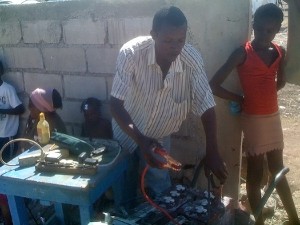
Food and water are still frighteningly scarce in Port au Prince two weeks after the earthquake, but at least one precious commodity is relatively easy to find: a charge for your cell phone. All over this shattered city, on rickety tables at the entrances to refugee camps and on rubble-strewn sidewalks, you can find enterprising hustlers who have hooked up power strips to car batteries. For about 40 cents, they'll sell you a recharge for your mobile.
It's a crucial service in a city where both the electric grid and most landlines are still out of commission. Astonishingly, the cellular network was back up, to a limited extent, within two days of the quake. Data-heavy voice calls are still unreliable, but text messages get through without trouble. That's why there's been such a torrential stream of Tweets out of Haiti. And in-country, mobiles are a lifeline for passing around information on where to find hospitals, food, and family members.
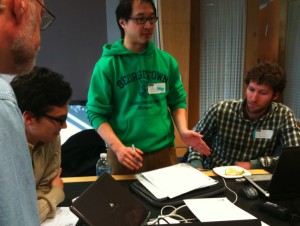
Expanding Haiti WiFi Network Impact with CrisisCamp DC
As Inveneo builds a long-distance wireless Internet network that will be shared with 15-20 NGO's in Haiti, we're designing the high-speed point-to-point WiFi links to be robust and sustainable. We want the NetHope member agencies to focus on delivery of critical relief services, not troubleshooting routers or antennas.
In that effort, we're using Ubiquiti technology, the cheapest, highest performing hardware for quick WiFi network buildout. But for it to handle the complexity and bandwidth of our multi-node network, we needed to enhance the Ubiquiti AirOS firmware to be a self-configuring intelligent routing protocol.
Earthquake Geospatial Research Portal Free GIS datasets and online resources related to the Haiti Earthquake can be found here.
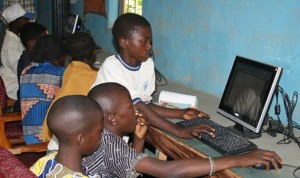
Connecting Those Who Need It Most
More than 2 billion people in the developing world live in rural and remote communities that lack basic access to information and communications technologies, such as telephony, computing, and Internet access. Access to these technologies, directly or via service organizations, can improve their lives in simple yet profound ways.
ICTs can:
- help save lives (rural healthcare and relief)
- provide better economic opportunities (agriculture, market access)
- help enforce human rights (monitoring/reporting)
- improve democratic processes (e-government)
- offer a better future for children (education)
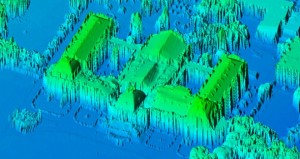
New 3-D Aerial Images of Haiti Will Aid Recovery and Research
New three-dimensional radar and hi-resolution aerial images of Port-au-Prince and the surrounding areas released starting Friday could boost both recovery and research efforts in Haiti in the wake of the magnitude 7.0 earthquake that struck on Jan. 12.
Satellite images and aerial photos have been important resources, but the flatness of those images makes it hard for viewers to identify what they’re looking at.
Congressional Research Service Report of 15 January 2010, not well sourced, between AID and USSOUTHCOM we do NOT appear to have a full court press in motion.
US Southern Command Updates on Haiti. 5,000 bed hospital, 250,000 wounded and without care for first fifteen days (gangrene and blood poisoning have set in, most will die). Oops. What part of massive, Berlin Airlift, multinational harmonization, big air into little air are we not understanding here?
Critics Of Obama's Haiti Relief Effort Contradicted By Hospital [Not Really]
On Tuesday, the Wall Street Journal published a scathing column comparing the Obama administration's response to the earthquake in Haiti to former President George W. Bush's much-derided handling of Hurricane Katrina.
The authors are three New York-based physicians who traveled as a medical team to the island in the aftermath of the destruction. They were remarkably harsh in their findings, gathered after 60-plus hours of work and more than 100 operations. “The U.S. response to the earthquake should be considered an embarrassment,” they concluded.
The crux of their complaints is that ineffective coordination among U.S. agencies led to medical teams and supplies not going where they were needed.
The authors of the op-ed have a slightly more critical perspective on the crisis than Matthews and Grant. They relay that, “warehouse-size quantities of unused medicines, food and other supplies” remained at the airport, “surrounded by hundreds of U.S. and international soldiers standing around aimlessly.” If true, this obviously represents a major bungle in relief coordination.
Journal: Haiti Rolling Directory from 12 January 2010



